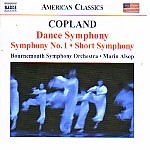All of these works predate Aaron Copland’s populist American ballets, but they reveal perhaps even more tellingly just what a talented and individual voice he had right from the start. The most important piece here is the Short Symphony (a.k.a. Symphony No. 2), a stunning essay in rhythmic lyricism that was considered all but unplayable when written in 1933–so much so that Copland rewrote it as a sextet. This performance hasn’t quite the sharpness and sizzle of the Orpheus Chamber Orchestra recording for DG, but the Bournemouth Symphony under Marin Alsop shows itself more than capable of mastering the music’s intricacies.
The other two performances are even finer. Alsop catches the bittersweet lyricism of the First Symphony’s outer movements very affectingly, while the whirlwind central scherzo is dazzling. The same observation holds true of the Dance Symphony, which works its way to a fine frenzy in a finale that strikingly anticipates the mature composer of the 1940s. Copland’s bright, open textures come across well in the problematic acoustic of the Poole concert hall; this is one of Naxos’ better recordings from this locale, graced with some really impressive bass sonorities. This is an intelligently planned and impressively executed disc.
































